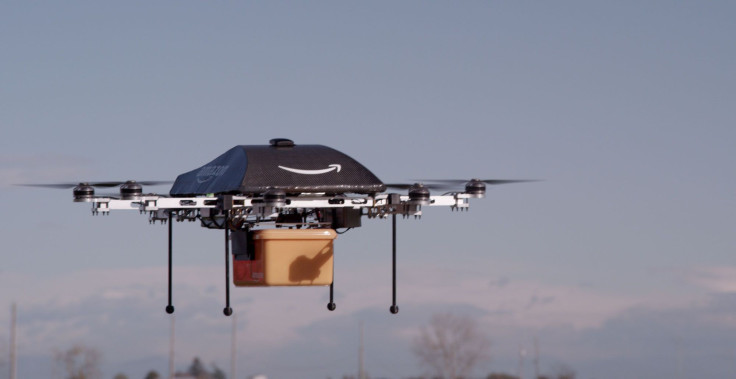Amazon ‘Committed’ To Prime Air Drone Delivery, Will Contest FAA Restrictions

If Amazon and Google want to get their airborne delivery services off the ground in the United States, they will have to sway the Federal Aviation Administration to loosen proposed rules for commercial drone usage introduced Sunday. Among the regulations, the FAA said commercial drones must fly within the line of sight of their operators, cannot drop items from the sky and cannot fly over anybody who is not "directly involved with the flight."
Unmanned aerial vehicle (UAV) advocates say the proposals are too restrictive and plan to vigorously contest the regulations during the upcoming public comment period. “That to me is the death knell of these proposed rules,” said Michael Drobac, executive director of the Small UAV Coalition, which represents various companies interested in drone usage, including Amazon and Google. “The idea that ... you have to ensure that every person on the ground is associated with the project is absurd. It can’t be done, and it shouldn’t have to be done.”
In the past year and a half, both Amazon and Google have announced their hopes to launch drone delivery services. Amazon Prime Air and Google’s Project Wing would carry products purchased online to consumers and drop the items at their doorsteps. Under the proposed rules, Amazon and Google would not be able to operate their services in the U.S., and that already has Amazon saying it will take its air-delivery service to countries that are not so restrictive.
“The FAA’s proposed rules for small [unmanned aircraft systems] could take one or two years to be adopted and, based on the proposal, even then those rules wouldn’t allow Prime Air to operate in the United States,” Paul Misener, Amazon’s vice president of global public policy, said. “The FAA needs to begin and expeditiously complete the formal process to address the needs of our business, and ultimately our customers. We are committed to realizing our vision for Prime Air and are prepared to deploy where we have the regulatory support we need.”
Amazon’s complaints notwithstanding, many in the industry have applauded the FAA’s rules, calling them a good start for legalization of commercial drone usage. Under the proposed rules, businesses could use drones weighing less than 55 pounds in the daytime, go up to 500 feet in altitude and fly at speeds of up to 100 miles per hour. These drones could be operated by anyone who is at least 17 years old, passes an aeronautical knowledge test and obtains a certificate from the FAA.
The public now has two months to send the agency their comments, which will be reviewed and could influence the FAA to modify its proposal.
“This is a good first step in an evolutionary process that brings us closer to realizing the many societal and economic benefits of [unmanned aerial systems] technology,” Brian Wynne, president and CEO of the Association for Unmanned Vehicle Systems International, said. “As an industry we believe it’s important that the final rule enables the many civil and commercial uses for UAS technology in a safe and responsible manner and without being unnecessarily restrictive.”
Google, Amazon and others who wish to fly their drones beyond operators’ line of sight and above humans will have to either prove to the FAA that it can be done safely or get Congress to pass a law that legalizes their services.
“Companies like Amazon and Google that have projects that depend upon more relaxed regulations will submit their thoughts to the FAA. It’s unlikely that the proposed rules will undergo major revisions before becoming law, but there is likely some wiggle room,” Dima Tokar, co-founder of consulting firm MachNation, said. “We expect that as the drone space evolves and as the risks and benefits are better understood, revised regulations will follow.”
Many believe that Amazon and Google will ultimately get their way, but as the FAA has shown, it is easing into the process of commercial drone usage and placing a priority on safety. “Landing a device with rapidly spinning blades presents its own issues,” Matt Waite, founder of the Drone Journalism Lab at the University of Nebraska-Lincoln, said. “I’ve said it before and I’ll say it again: It’s all fun and games until little Sally loses a finger because she reached for her birthday present before the delivery drone dropped it off.”
© Copyright IBTimes 2024. All rights reserved.






















